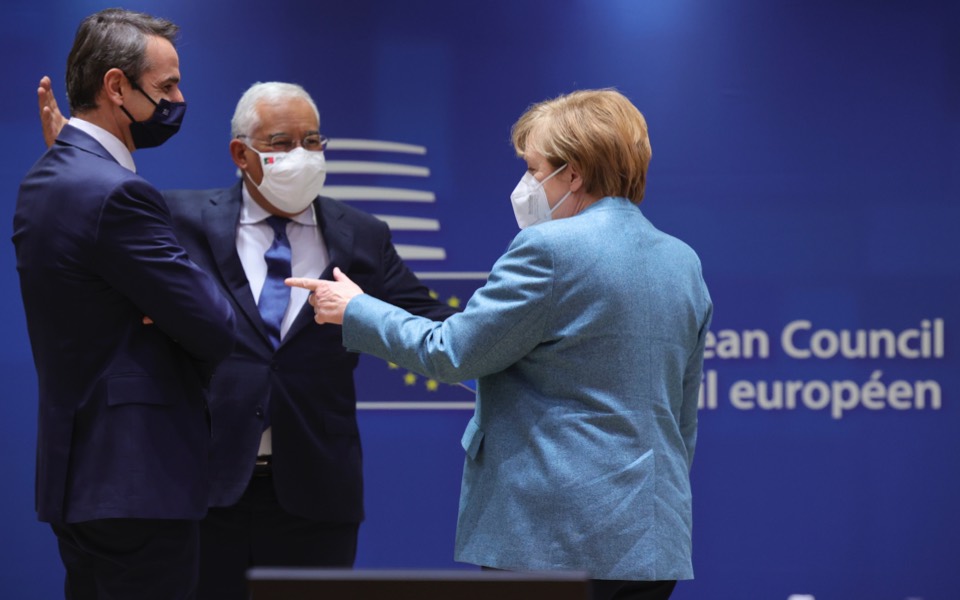Consequences of the strategy vacuum

I have previously criticized the government for what I call its “perpetual strategy vacuum.” In the four months since I last did so, the situation has, unfortunately, deteriorated. The government has chosen to bury its head in the sand in the face of escalating Turkish provocations, failed to set red lines, been caught in constant contradictions and inconsistencies between Maximos Mansion and the Foreign Ministry, as a result of the prime minister’s digression from foreign policy constants, and attempted to present a succession of failures as great victories.
As a result, Turkish aggression has come unfettered; for months the Oruc Reis seismic survey vessel has been violating our sovereign rights unhindered and at less than 12 nautical miles from Greek shores, with navigational advisories, or Navtexes, threatening surveys in waters less than 6 nautical miles from the country’s coasts as well.
Prime Minister Kyriakos Mitsotakis’ resounding defeat at the recent European Council in failing to secure sanctions against Turkey is but the tip of the iceberg in the shipwreck that is New Democracy diplomacy. As hard as the government tried to justify its failure with leaked statements to the media indicating that the European Union is approaching the issue “one step at a time,” the fact is that the Council’s conclusions represent many steps back.
Not only did it fail to impose sanctions and indicated that it will tolerate Turkish exploratory activities until March at least, it also failed to condemn Turkish activities as illegal. It was a stark departure from the conclusion of the June 2019 European Council, the last one where Greece was represented by then prime minister Alexis Tspipras, when the EU “strongly” condemned “Turkey’s illegal actions in the Eastern Mediterranean and Aegean.” Not only did it explicitly include the Aegean in its condemnation, it also described these activities as outright illegal as opposed to merely provocative.
The other excuse invoked by the government, that the European Union is waiting for US President-elect Joe Biden to be sworn in, is in fact the very reason why Mitsotakis’ failure is a strategic one. The EU, with Greece’s contribution, should be at the forefront of developments, not standing by waiting for them to happen. This is the main reason – a strategic reason, above solidarity for a member-state – why sanctions needed to be imposed. Because of its internal contradictions, ND has so far been unable to take a stand on the key strategic question raised by the incoming Biden presidency regarding Europe’s position in the nascent multipolar international system. In short, the two alternatives on the horizon are a strengthening of Europe’s strategic independence from NATO and the US or a return to pre-Trump Euro-Atlantic relations by accepting American hegemony over European defense matters.
The French response is centered on the notion of “European sovereignty,” with two key characteristics: first, strengthening the EU’s voice abroad with a common and extroverted foreign policy that is distinct from that of the United States, and, second, forming a European defense system that is independent of NATO, on the regulatory basis of the solidarity clause in Article 42(7) of the Treaty of the European Union. This position is in line with the desire to turn Europe into a global player and not just a global payer, to quote Jean-Claude Juncker.
Apart from the obvious significance of transatlantic relations, there is no such thing as a unified West, nor are the long-term strategic interests of America and Europe in perfect accord. Even Henry Kissinger said that a powerful and independent EU would be against the United States’ strategic interest, as would any coalition of Eurasian powers, because it “would have a real capacity to outstrip both the US economy and military” (“Diplomacy,” 1994).
The notion of “European sovereignty,” however, corresponds with Greek interests, specifically in that it involves safeguarding its national borders as the bloc’s external border. But there is one important caveat: European governance must become more democratic. Common European defense cannot be left to bilateral agreement between France and Germany, like the 2019 Aachen Treaty, nor can it express neocolonial tendencies like treating the Mediterranean as the “mare nostrum,” nor can it be designed according to the interests of national defense industries.
Not only has the Greek government failed to position itself clearly on this dilemma; it vacillates continuously, even over its defense choices: It announced the purchase of French frigates a few months ago, then said there would be an international tender, and now there are leaks about the acquisition of American navy ships. As a result of this chaotic strategic vacuum, Mitsotakis is giving Turkey the ability to force the US and the EU into accepting its geostrategic demands, posing as a leading regional power in the Caucasus and the Near and Middle East, but also as a new Mediterranean naval power. President Recep Tayyip Erdogan is casting Turkey as a critical factor in every open front and an indispensable player for the West.
Greece’s needs in terms of its national strategy demand that it continues to invest in bilateral relations with the US – on the basis of reciprocity – while being focused on promoting the EU’s strategic independence and bolstering a common foreign policy. It can contribute to the latter as an agent of stability in the Balkans and the Eastern Mediterranean but also as a bridge with Russia, China and the Arab world. Greece must seek to play a leading role in the shaping of the Euro-Turkish agenda, including a relaunch of Greek-Turkish dialogue in this context. Otherwise, developments do not bode much better for Greece or the Republic of Cyprus in 2021 than they did in 2020.
Giorgos Katrougalos is a professor of public law and the opposition SYRIZA party’s shadow minister of foreign affairs.





